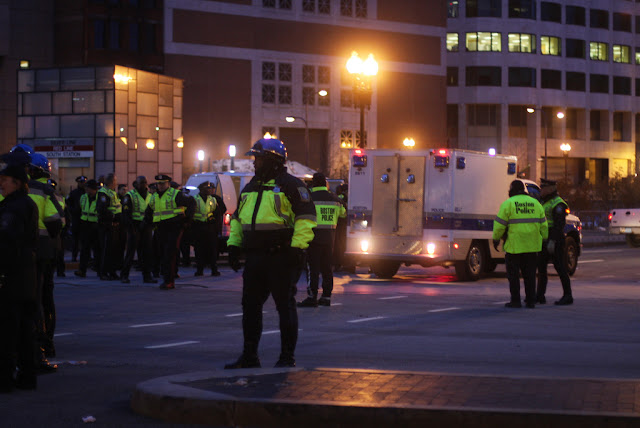These efforts have run the gamut from the sweetly oblique (even the Lyric's Mikado found room for slogans from Zuccotti Park) to the well-intended but under-developed (The Civilians' Paris Commune at ArtsEmerson) to something close to self-satire: the high school clique that runs Company One, for instance, actually intimidated Bryck into giving up financial support for his piece on Occupy in exchange for hosting it. That's right - they abused him financially before they'd produce his show on financial abuse. It doesn't get much richer than that.
But you know, I'm pretty philosophical by now about the high-mindedness of the theatrical community (and the critics who cover it). For in the end, the theatre's political hypocrisy only reflects that of its audience (if all the people who actually claim to be committed to progress actually put down their programs and did something about our problems, much progress would immediately be achieved - which trust me, ain't gonna happen).
So I'm more interested these days in parsing the spectrum of our theatrical response to the political issues that Occupy exposed, but obviously failed to solve. And I have to give the laurels in this particular contest (at least so far) to the Huntington, which in a pair of nearly book-ended productions (Kirsten Greenidge's The Luck of the Irish and now David Lindsay-Abaire's Good People) has limned the issues of apartheid - in terms of class as well as race - that have long riven this city in a way that I think no other local theatre has ever dared to do. (Tellingly, the A.R.T's response to Occupy was the widely-derided Marie Antoinette - more unconscious self-parody!)
 |
Johanna Day suffers The Luck of the Irish in Good People. |
So it's highly appropriate that the Huntington should turn its artistic sights directly on the Hub. You could even argue that it's high time - how could Boston have boasted (for decades) two major regional theaters that generally ignored their home turf? Well, because both stages were aligned with the gown, not the town, in this town-and-gown burg, that's why. Only to be fair, critics of the Huntington I think would be hard pressed to name any major regional company that has thrown on its home team the sustained critical light that Irish and People have together cast on Boston. Indeed, I'd like to think (or hope!) that this long-overdue attention will only be the start of a trend - if the Huntington's influential development program kept a focus on not just local writers but local stories, I think it could contribute something really essential to the life of the city.
Just a few more lines of praise for this company before I move on to an analysis of Good People. Now I don't want to pretend the Huntington doesn't have its flaws; it does. Its artistic director, Peter DuBois, like his evil twin at Harvard, is clearly too focused on his New York career - although you could argue that some of the culture-lite fodder he has generated for Manhattan and the Times girls (like Sons of the Prophet and Becky Shaw) hasn't been all that bad. And unlike you-know-who, DuBois has put together dazzling seasons in absentia by pulling together probably the best roster of outside directors, actors, and artists that the Huntington has ever seen; to his great credit, he differs from his predecessor, the talented Nicky Martin, in that he seems happy to invite his equals (and even betters?) onto the Huntington stage.
Now I know we've also suffered through the likes of A Civil War Christmas, Before I Leave You, and Captors during DuBois' tenure - yikes! But every theatre strikes out sometimes, and every company occasionally panders to segments of its audience. You could also argue that formal experimentation has always been slighted at the Huntington - but I'd argue back that by now the millennials have given formal experimentation a very bad name. More troubling is the large gap that still lingers around the greatest classics (sorry, but the Propeller frat boys, fun as they are, don't really deliver the Shakespearean goods, and where are Chekhov and Ibsen, not to mention Socrates and Shaw?).
But I have to weigh all that against a truly dazzling series of successes, at least after DuBois' wobbly debut season: not only have we enjoyed masterpieces like Candide, but we've also seen remarkable productions of All My Sons, Stick Fly, Bus Stop, and Private Lives, and worthy versions of Ma Rainey's Black Bottom, Ruined, The Luck of the Irish, Circle Mirror Transformation, Educating Rita, Fences, and now Good People. That's a long list - a lengthier stretch of sustained, large-scale artistic success than I think I could credit to any other local theatre in the thirty years I've lived here.
Of course the question is - can they keep it up? I'd argue that Good People implies they can, as I'll explain in the second half of this series.




